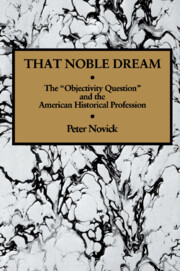Book contents
- Frontmatter
- Contents
- Preface
- Introduction: Nailing jelly to the wall
- I Objectivity enthroned
- II Objectivity besieged
- 5 Historians on the home front
- 6 A changed climate
- 7 Professionalism stalled
- 8 Divergence and dissent
- 9 The battle joined
- III Objectivity reconstructed
- IV Objectivity in crisis
- Appendix: Manuscript collections cited
- Index
7 - Professionalism stalled
Published online by Cambridge University Press: 29 March 2011
- Frontmatter
- Contents
- Preface
- Introduction: Nailing jelly to the wall
- I Objectivity enthroned
- II Objectivity besieged
- 5 Historians on the home front
- 6 A changed climate
- 7 Professionalism stalled
- 8 Divergence and dissent
- 9 The battle joined
- III Objectivity reconstructed
- IV Objectivity in crisis
- Appendix: Manuscript collections cited
- Index
Summary
Prewar historians had been exhilarated at the speed with which they had professionalized the historical venture, and were confident that a bountiful harvest would result. Building on the foundation they had laid, the new profession would achieve greater and greater status and authority. It would, like the natural scientific disciplines which were its model, establish rigorous norms of mutual criticism based on universalistic standards. A professionalized, scientific, history would rapidly construct the cumulative and convergent edifice of historical truth which figured so frequently in their rhetoric. For older historians the less attractive features of professional scholarship, principally its narrow pedantry, were temporary, attributable to the newness of the venture. Jameson, who had acknowledged that the turn of the century was an era of “second class work,” thought that the first world war would usher in “an age of generalization, of synthesis, of history more largely governed and informed by general ideas.”
We have passed through what is apparently the greatest crisis in history, have undergone what is apparently the greatest calamity that has ever befallen the human race.… Now any study of the history of historical writing makes clear the fact, that each great crisis in human affairs has evoked in the next generation a striking access of interest in human history and a crop of great historians to meet the need.
- Type
- Chapter
- Information
- That Noble DreamThe 'Objectivity Question' and the American Historical Profession, pp. 168 - 205Publisher: Cambridge University PressPrint publication year: 1988



